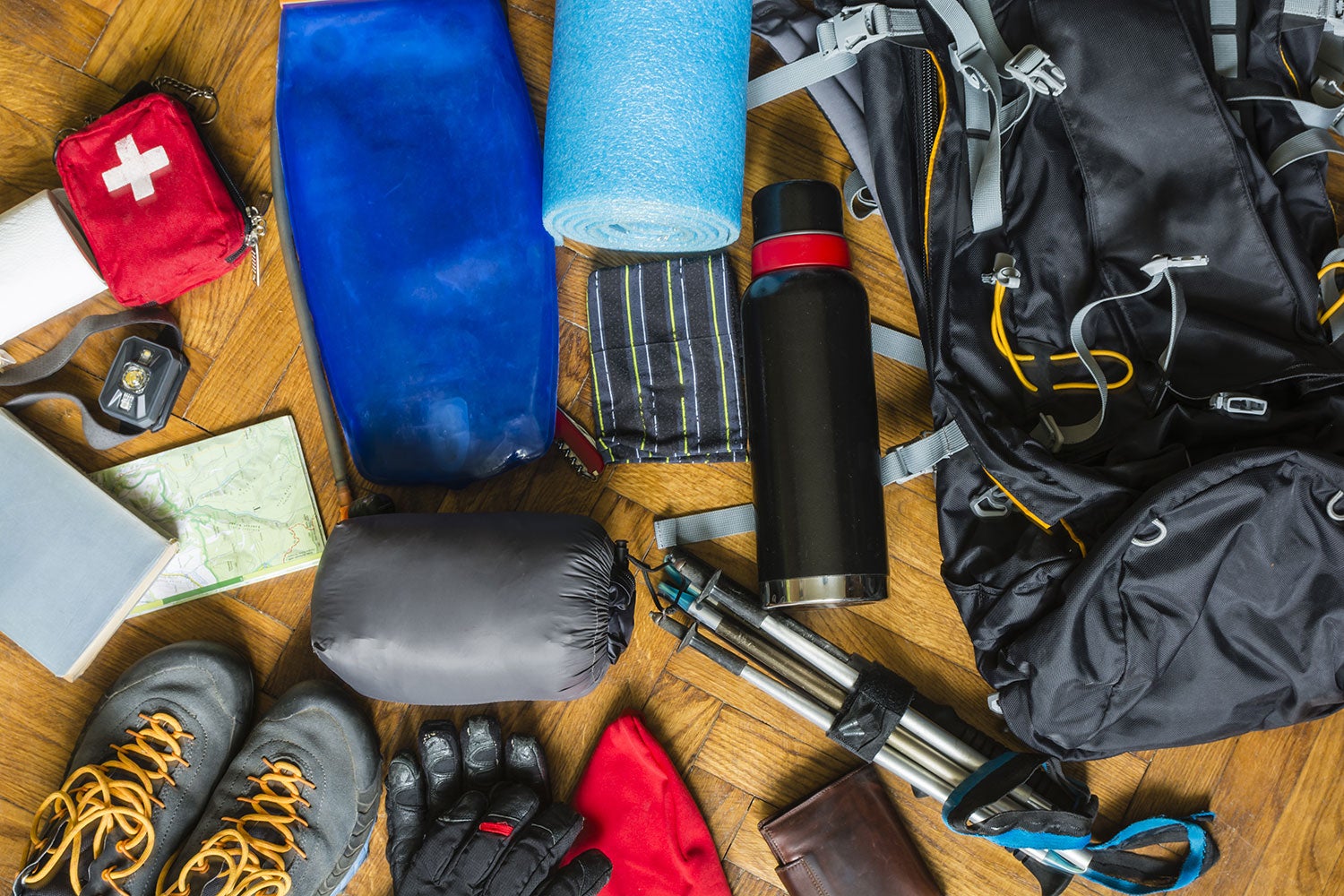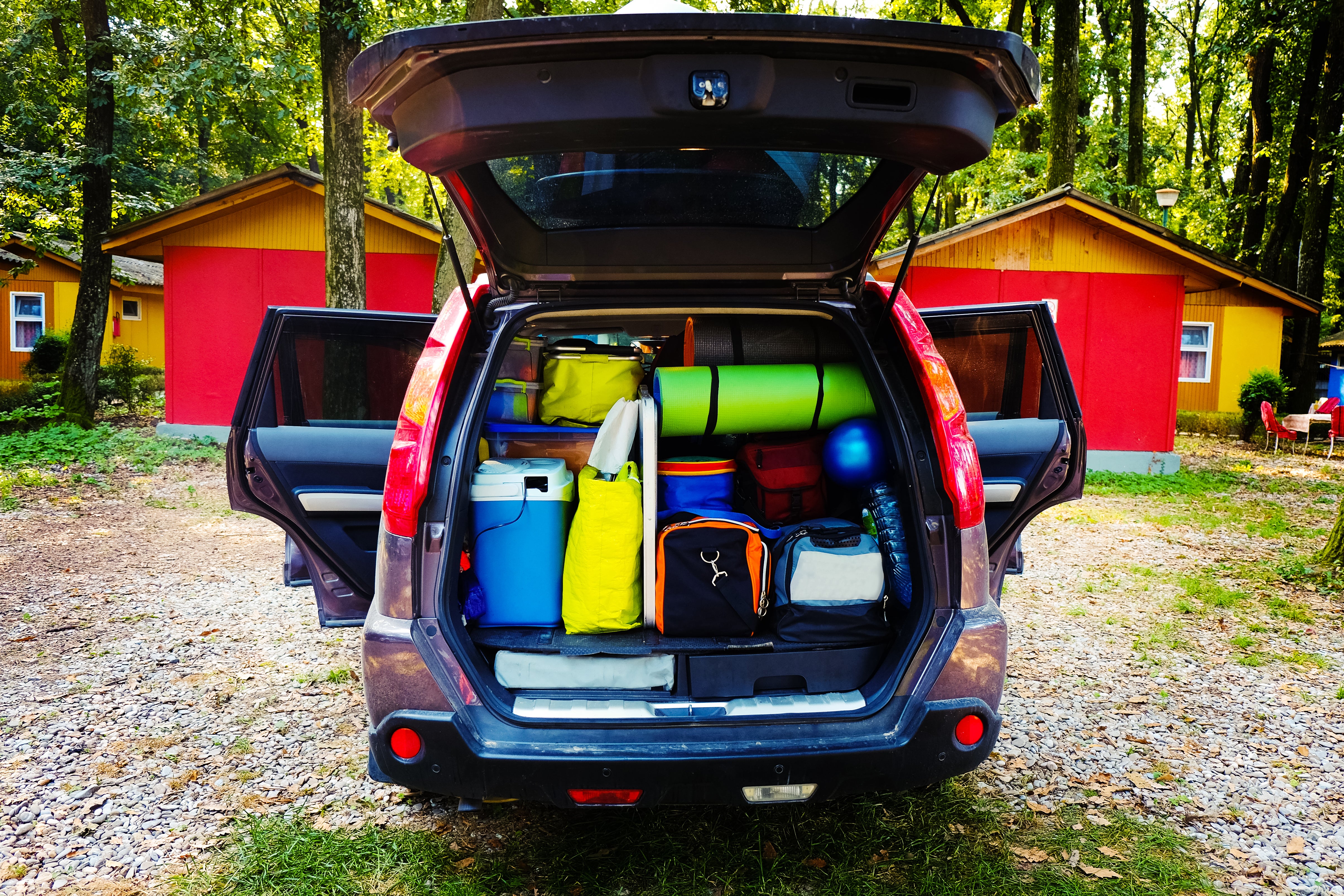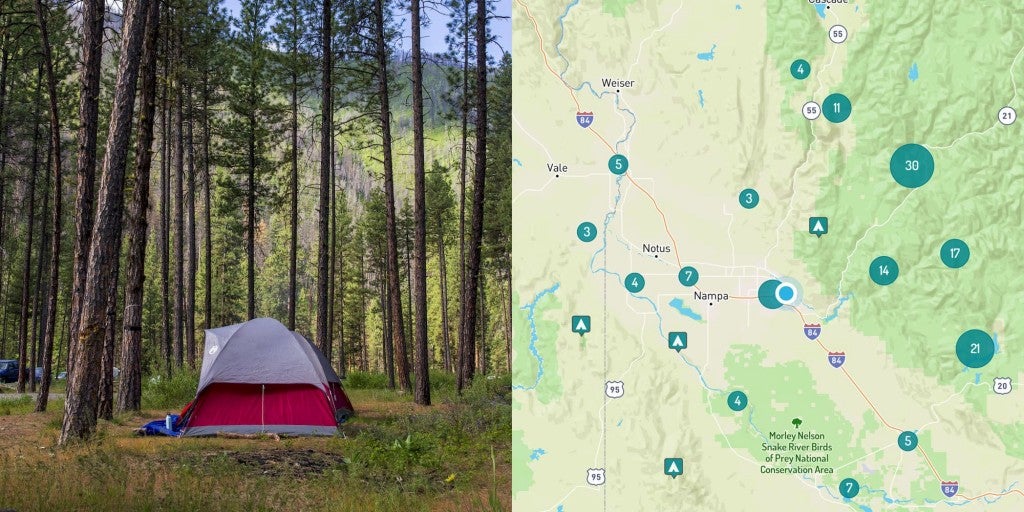This article includes affiliate links, which generate a small commission for The Dyrt through attributed purchases.
I’m going to be honest—I am “that camper” at the campground. As soon as I’ve found my camping spot for the night, whether car camping or backpacking, I undergo a gear explosion. Clothes, food, and shelter are strewn about in a chaotic mess.
Sometimes, it feels like I spend a quarter of my time in the outdoors rummaging through my gear to find what I need, and then going through yet another reorganization process.
This is why I finally started asking my friends (and the internet!) for better camping storage ideas.
20 Super Helpful Camping Storage Ideas

Staying organized at your campsite is important for a variety of reasons. Knowing where to find your gear can help keep you safe in case of an emergency. Proper storage helps you avoid attracting wildlife to your site and habituating them to humans. Good camping storage ideas can also save you time, ensuring that you don’t spend the bulk of your trip unpacking and repacking, unpacking and repacking.
Since accepting my condition as “that camper,” I’ve started using these camping storage ideas to improve my organization and experience while exploring the great outdoors.
1. Be Organized, But Keep it Lightweight
I’m a backpacker at heart, so my first thought when trying to get better organized on the trail was how much weight a bunch of organizational doodads would add to my pack. However, good utilization of your backpack’s existing pockets can keep you organized without adding any additional weight. Simply designate which pocket will have toiletries, which will have snacks, which will have extra layers, etc.—and then keep it that way, every single time you camp.
However, not all backpacks or other outdoor storage items have sufficient built-in pockets. When I was biking the Chesapeake and Ohio Canal Trail, my panniers were one big pocket. In these cases, I like to use lightweight organzing bags, such as these Peak Design Packing Cubes, which zip closed, compress super mall, and are fairly lightweight.
2. Color Code Your Dry Bags
I do a lot of kayak and canoe camping, and when I started, I only considered the size of my dry bags when packing up my gear. However, many dry bags aren’t see-through, so I’d get to camp and find myself, once again, searching ravenously through my many dry bags for dinner supplies. When I’d finally find my dinner bag, I’d open it up and have to search through a bunch of breakfast stuff before I eventually found dinner. This is all to say that color coding my dry bags is now one of my favorite camping storage ideas.
I like to use 10- to 20-liter dry bags in many different colors to organize my gear. I put breakfast in the orange dry bag, lunch and snacks in the red dry bag, and dinner in the blue dry bag. Sleeping gear goes in green, and extra clothes go in yellow. I always know which one to grab when I need it most.
3. Use See-Through Storage Bins
Using see-through storage bins is a perfect camping storage idea for car camping trips. This keeps all of your gear secure in your trunk, so it’s not rolling about with every twist and turn of the road. When you get to your campsite, you don’t even need to take the lid off of the bin to see what’s inside; rather, you can quickly peek around the sides of your different bins to make sure you’ve got the right one before you dig in.
Want an adventure of your own? Find free camping near you
Did you know that almost all states in the US have free camping?
Although, some of it is not-so-great and can be hard to find.
There is an easier way:
- Hand-picked free campsites
- Pre-saved to your phone
- The best in all 50 states
It’s the only hand-picked list of 5,000 free camping locations that you will find anywhere.
It comes with a bunch of other features like last-minute camping texts, offline maps, etc.
You can check it out for free today by starting a free 7-day trial. After the 7-day trial, the membership is just $35.99 for a full year of access — well worth it if you camp more than 2 times per year.
4. Keep Smelly/Scented Stuff in One Space
On a camping trip with my partner in Wyoming’s bear country, I went to grab a book out of one of our bags to bring into the tent with me. As soon as I pulled it out, I realized it smelled like perfumes. It had been packed closely to our toiletries, and had absorbed the smells. Having this in the tent wasn’t going to work, so I ended up storing it in the bear box for the night.
When packing for camping trips in places where bears are active, make sure you isolate any of your smelly stuff to specific bags or boxes so they don’t contaminate your other gear. You can also use Ursack Bear Bags, which offer some protection, especially slung into a tree overnight.
5. Embrace Multi-Use Items
A great way to stay organized while camping is to be mindful in the first place about how much gear you’re bringing. Focusing on gear items that can be used for multiple functions is a great way to do this. Use a carabiner that’s also a knife and a firestarter. Use your cooking pot as your bowl. Find a tent that can be set up using your trekking poles. With a little creativity, you can stay organized by using what you already have more intentionally.
6. Know What You Keep on Your Person-—and Where it Goes at Night
When I’m hiking or otherwise exploring the outdoors around my campsite, there are certain safety items I always want to have on hand. These include a compass, whistle, small knife, and headlamp. These are all items I keep on my person. I know my whistle and headlamp are on strings around my neck, and my compass and knife are in the large pocket on my hiking pants. At night, these go in the net at the foot of my tent. When I dress in the morning, they go back on my person. Keep your safety items organized by keeping them close.
7. Two Words: Fanny Pack
I was a big fan of fanny packs as a kid and I’m pumped that they’re now back in style. Fanny packs are a great way to organize the gear you need for the day. They’re no-hassle and allow you to keep what you need close and easily accessible.
8. Have Specific Storage Ready for Your Trash
A common mistake I used to make when camping was not bringing along something to store my trash. I didn’t think about it at first because I didn’t have any trash to start. However, as I started to work through my granola bars and other trail snacks, I’d soon find myself having to stuff my wrappers into various pockets or bags that were available at the time. If you don’t plan in advance for where you’re going to put your trash, your other camping storage ideas may be compromised. I like to reuse gallon Ziplocs for trash storage on backpacking trips. I keep some old grocery store bags in my trunk for trash storage during car camping trips.
9. Compression Sacks are Your Friend for Cramped Quarters
The first time I went winter camping, I realized that my cold-weather gear took up a lot more space than what I bring for summer months. I needed a camping storage idea that would help me cope with limited space. Compression sacks are perfect for this. I use Seal Line Blocker Compression Dry Sacks to store my gear when space is cramped. They’re lightweight and have a PurgeAir valve to help compress clothes, sleeping bags, and other gear even further.
10. Make a Poop Bag
When my partner took his 8-year-old nephew on his first canoe camping trip, he wanted to make pooping in the woods a fool-proof process for him. Thus, the “poop bag” was born, and it has since become a staple for our camping trips to keep our “when nature calls” items well-organized and ready to grab as soon as the call comes.
The poop bag is pretty simple. It’s a 10-liter dry bag containing everything you need for a poop break. My partner then used a Sharpie to write a “How to Poop in the Woods” numbered list on it, including such wise tidbits as, “don’t get poop on yourself or the trowel.” Inside the dry bag are all the necessary items—a hand trowel, toilet paper, hand sanitizer, and opaque Ziplocs for used toilet paper. It’s nice to have everything in an easy-to-grab bag, especially for campers who are new to the Leave No Trace procedures of pooping outside.
11. Set Up a Hand and Dish Washing Station
Having a designated space for hand and dishwashing is a great way to maintain order at your campsite. If car camping, you can get a 5-gallon water jug with a spigot to put on a picnic table. Keep your soap next to it and use bungee cords to strap a paper towel rack or hand towel holder above it. On the ground beneath the water jug, place a plastic bin to catch your gray water.
12. String a Clothesline at Camp
One camping storage idea that’s especially useful for multi-day camping trips is a clothesline. You can use this to hang and air out your smelly hiking clothes or wet bathing suits and life jackets. You can also use it to keep gear away from curious critters.
13. Keep Gear Secure in Hard-sided Containers
In addition to hanging things, using hard-sided containers is an excellent way to store your gear while keeping it secure from common campground critters like raccoons. We repurposed some old 5-gallon primer buckets with screw top lids for gear storage on our canoe camping trips. We keep our entire camp kitchen, including fuel, in one of these buckets, which helps with organization. As a bonus, they’re also water-resistant.
14. Repurpose a Hanging Shoe Rack
Hanging shoe racks are a wonderful camping storage idea because of how versatile they are. They can be hung up inside an RV, or even on a clothesline at your car camping site. With several different pockets, they’re great for organizing kitchen supplies, food, and toiletries.
15. Use Mini Containers to Bring Along Spices
Just because you’re camping doesn’t mean you should eat boring food. Add some pizzazz to your camp meals by bringing along your favorite spices. Store them in repurposed mini containers, such as old lip balm jars with screw tops or Tic Tac containers. You can also find some pretty snazzy traveling spice cases for sale if you don’t mind spending the money.
16. Make Portable Drawer Sets Your Best Friend
An easily overlooked camping storage idea is one you might see more often in an office. Portable, plastic drawer sets are a great way to stay organized at camp. In RVs, you can use them to save space and tuck away items while they’re not in use. If you’re car camping, they’re useful for organizing the gear in your trunk rather than having it roll around in the car.
17. Take Advantage of Old Metal Coffee Cans
Old coffee cans are one of my favorite reusable camping storage containers. They’re sturdy, stack easy, and don’t take up much space. And they’re perfect for repackaging various snack foods, like trail mix or chips, if you don’t want to bring a bunch of plastic bags along. Some people also store their toilet paper rolls in these; they’re the right size and water-resistant with a secure lid.
18. Install a Wall-Mounted Magnetic Strip
If you’re lacking drawer space in your RV or camper van, one of the more helpful camping storage ideas is a wall-mounted magnetic strip. These are helpful for storing your knives, tools and other metal utensils. You can also add some magnetic hooks to hang other gear or clothing.
19. Have a Camping Grab Bag Ready
Getting myself out the door is often the most frustrating part of camping; the prep can be overwhelming is everything I need to go camping is stored in different places. This is why I’ve taken some time to prepare a camping grab bag. This backpack has everything I would need for a quick, last-minute night out.
For items I don’t want to store in the grab bag long-term (such as my sleeping bag, which needs to have space to expand in its fluff bag), I write those down on an index card that I keep in the front pocket of the bag. This way, I have a quick checklist of what to add to the bag before I head out.
20. Label Large Plastic Totes by Gear Type for Post-Trip Storage
Keeping gear stored and organized properly even once you’re home will lead to easier organization and storage when you’re ready to venture out again. Invest in some large plastic totes and use duct tape to label them by gear type. This will make it easy to identify where the gear you need is when you need it. We have one tote labeled winter camping, another labeled camp kitchen/water storage, one labeled shelter, and a couple others. They stack easily on top of each other and fit well in the closet until we need them.
Related Campgrounds:
- Hocking Hills Camping, Logan, OH
- Kings Canyon Camping, Kings Canyon National Park, CA
Popular Articles:
Articles on The Dyrt Magazine may contain links to affiliate websites. The Dyrt receives an affiliate commission for any purchases made by using such links at no additional cost to you the consumer.



